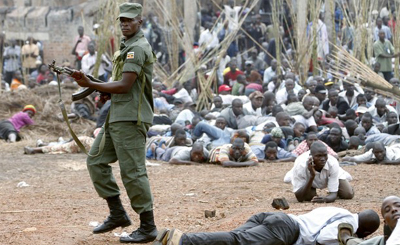It seemed like déjà vu. Another major protest erupts in Uganda and journalists face the wrath of authorities and the public alike. Tensions between the government and the traditional kingdom of the Baganda, the largest ethnic group based in central Uganda, flared again Tuesday evening after a fire of unknown origin ravaged the tombs of traditional kings, a UNESCO World Heritage site on Kasubi Hill near the capital, Kampala. Last September, a number of journalists were attacked or harassed while covering deadly clashes between the government and Baganda protesters.
This week, journalists told CPJ, soldiers shot in the air to disperse Baganda protestors who demanded an immediate investigation into the cause of the fire. As journalist and blogger Rosebell Kagumire put it, “this relationship between President Yoweri Museveni’s government and the Buganda kingdom is far from rosy and this has already given fertile ground for many to think there was some foul play.” The torched mausoleum, built in 1882, contained the tombs of four ancient kings along with cultural relics. The tomb represented a major spiritual center for the kingdom.
Moses Lemisa, who covered protests on Wednesday for Uganda’s largest vernacular daily, Bukedde, suffered a hand injury and saw his camera destroyed. He described it as one of the hardest days of his five-year career as a freelance photojournalist. Lemisa said he was injured when a security agent of the Presidential Guard Brigade struck him with a gun as he was taking photographs of security forces firing live rounds to disperse protestors. (Authorities said three people were shot dead in the clashes.) Despite the injury, Lemisa said, he continued working only to be assaulted later by demonstrators who destroyed his camera. Benjamin Ssebaggala, another freelance photojournalist who works with Bukedde, said he was struck by stones as he tried to take photos of the protestors. Bukkede Photo Editor Herbert Lemansi said the journalists were targeted by protesters because of their affiliation with a media outlet perceived as pro-government.
It was familiar scene for frontline journalists such as Lemisa and Ssebagala, who also carried their cameras into deadly September 2009 street riots. That time, violence erupted after the government attempted to block Bagandan King Ronald Muwenda Mutebi from visiting Kayunga County in northern Kampala amid tensions between the government and the kingdom over land and political rights.
Ssebaggala recounted how a police officer seized his camera that day. He eventually got his equipment back, but Lemisa was not so lucky. His camera at the time, also a Nikon D8, was destroyed by demonstrators as he took photos of them. “Protestors don’t want journalists to take their photos. Once they see their photos in newspapers, they fear the government will come after them. Sometimes I cannot blame those people who damaged my camera,” he said. Lemisa managed to replace his old D8 with a new one after spending 2 million Ugandan shillings (the equivalent of US$ $1,000), he said.
The government reacted to the September 2009 riots by closing down radio stations, including Central Broadcasting Service, a prominent broadcaster with close ties to the Buganda Kingdom. The station remains closed today. Alex Nsuburu, a former producer for the banned radio station, told CPJ that station staffers have been frustrated, especially by their inability to cover this week’s fire and subsequent clashes. “The [burnt] tomb is considered by UNESCO as a world cultural heritage site. Not reporting on something with such local and global significance is a great loss.” Nsuburu fears the government will use the latest developments as an excuse to keep CBS closed indefinitely. “They blocked us last year claiming we incited people to riot. But look at [this week]: There were some serious demonstrations on the street. President Museveni was even blocked by protestors from visiting the site. Whether we broadcast or not—people are reacting,” he said.
Godfrey Mutabazi, chairman of the Ugandan Broadcasting Council, disagreed. “I don’t think this terrible episode will complicate the situation with CBS,” he told CPJ. “In fact, they have stalled the process themselves by taking this matter to court, instead of trying to sit and negotiate.” In December, CBS employees sued the government demanding an apology and compensation for their closure. In turn, the government called on the CBS management to apologize, relocate its studios, and drop the court case against them, according to local reports. Nsuburu believes government officials want an out-of-court settlement since “they know they are in the wrong. They did not follow proper procedures and closed us down with excessive force and no official notice.”
